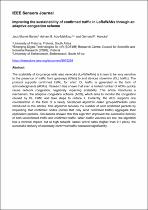 ResearchSpace
ResearchSpace
Improving the sustainability of confirmed traffic in LoRaWANs through an adaptive congestion scheme
JavaScript is disabled for your browser. Some features of this site may not work without it.
- ResearchSpace
- →
- Research Publications/Outputs
- →
- Journal Articles
- →
- View Item
| dc.contributor.author |
Marais, JM

|
|
| dc.contributor.author |
Abu-Mahfouz, Adnan MI

|
|
| dc.contributor.author |
Hancke, GP

|
|
| dc.date.accessioned | 2023-05-12T11:19:25Z | |
| dc.date.available | 2023-05-12T11:19:25Z | |
| dc.date.issued | 2022-12 | |
| dc.identifier.citation | Marais, J., Abu-Mahfouz, A.M. & Hancke, G. 2022. Improving the sustainability of confirmed traffic in LoRaWANs through an adaptive congestion scheme. <i>IEEE Sensors Journal, 23(2).</i> http://hdl.handle.net/10204/12775 | en_ZA |
| dc.identifier.issn | 1530-437X | |
| dc.identifier.issn | 1558-1748 | |
| dc.identifier.uri | DOI: 10.1109/JSEN.2022.3226273 | |
| dc.identifier.uri | http://hdl.handle.net/10204/12775 | |
| dc.description.abstract | The scalability of long-range wide area networks (LoRaWANs) is known to be very sensitive to the presence of traffic from gateways (GWs) to end devices (downlink (DL) traffic). The protocol supports confirmed traffic, for which DL traffic is generated in the form of acknowledgments (ACKs). Research has shown that even a limited number of ACKs quickly cause network congestion, negatively impacting scalability. This article introduces a mechanism, the adaptive congestion scheme (ACS), which aims to monitor the congestion caused by DL traffic and take steps to reduce it. Currently, the ACS supports one counteraction in the form of a newly developed algorithm called groupedPackets (also introduced in this article). This algorithm reduces the number of sent confirmed packets by requesting that confirmed nodes (nodes that only send confirmed traffic) aggregate their application packets. Simulations showed that this algorithm improved the successful delivery of both unconfirmed traffic and confirmed traffic. When traffic volumes are low, the algorithm has a minimal impact, but at high network packet arrival rates (higher than 0.1 pkt/s), the successful delivery of especially confirmed traffic increased significantly. | en_US |
| dc.format | Abstract | en_US |
| dc.language.iso | en | en_US |
| dc.relation.uri | https://ieeexplore.ieee.org/document/9975288 | en_US |
| dc.source | IEEE Sensors Journal, 23(2) | en_US |
| dc.subject | Acknowledgment | en_US |
| dc.subject | ACK | en_US |
| dc.subject | Adaptive Congestion Scheme | en_US |
| dc.subject | ACS | en_US |
| dc.subject | Groupedpackets | en_US |
| dc.subject | Long-Range Wide Area Network | en_US |
| dc.subject | LoRaWAN | en_US |
| dc.subject | Low-Power Wide Area Network | en_US |
| dc.subject | LPWAN | en_US |
| dc.subject | Scalability | en_US |
| dc.title | Improving the sustainability of confirmed traffic in LoRaWANs through an adaptive congestion scheme | en_US |
| dc.type | Article | en_US |
| dc.description.pages | 1660-1670 | en_US |
| dc.description.note | © 2022 IEEE. Due to copyright restrictions, the attached PDF file only contains the abstract of the full text item. For access to the full text item, please consult the publisher's website: https://ieeexplore.ieee.org/document/9975288 | en_US |
| dc.description.cluster | Next Generation Enterprises & Institutions | en_US |
| dc.description.impactarea | EDT4IR Management | en_US |
| dc.identifier.apacitation | Marais, J., Abu-Mahfouz, A. M., & Hancke, G. (2022). Improving the sustainability of confirmed traffic in LoRaWANs through an adaptive congestion scheme. <i>IEEE Sensors Journal, 23(2)</i>, http://hdl.handle.net/10204/12775 | en_ZA |
| dc.identifier.chicagocitation | Marais, JM, Adnan MI Abu-Mahfouz, and GP Hancke "Improving the sustainability of confirmed traffic in LoRaWANs through an adaptive congestion scheme." <i>IEEE Sensors Journal, 23(2)</i> (2022) http://hdl.handle.net/10204/12775 | en_ZA |
| dc.identifier.vancouvercitation | Marais J, Abu-Mahfouz AM, Hancke G. Improving the sustainability of confirmed traffic in LoRaWANs through an adaptive congestion scheme. IEEE Sensors Journal, 23(2). 2022; http://hdl.handle.net/10204/12775. | en_ZA |
| dc.identifier.ris | TY - Article AU - Marais, JM AU - Abu-Mahfouz, Adnan MI AU - Hancke, GP AB - The scalability of long-range wide area networks (LoRaWANs) is known to be very sensitive to the presence of traffic from gateways (GWs) to end devices (downlink (DL) traffic). The protocol supports confirmed traffic, for which DL traffic is generated in the form of acknowledgments (ACKs). Research has shown that even a limited number of ACKs quickly cause network congestion, negatively impacting scalability. This article introduces a mechanism, the adaptive congestion scheme (ACS), which aims to monitor the congestion caused by DL traffic and take steps to reduce it. Currently, the ACS supports one counteraction in the form of a newly developed algorithm called groupedPackets (also introduced in this article). This algorithm reduces the number of sent confirmed packets by requesting that confirmed nodes (nodes that only send confirmed traffic) aggregate their application packets. Simulations showed that this algorithm improved the successful delivery of both unconfirmed traffic and confirmed traffic. When traffic volumes are low, the algorithm has a minimal impact, but at high network packet arrival rates (higher than 0.1 pkt/s), the successful delivery of especially confirmed traffic increased significantly. DA - 2022-12 DB - ResearchSpace DP - CSIR J1 - IEEE Sensors Journal, 23(2) KW - Acknowledgment KW - ACK KW - Adaptive Congestion Scheme KW - ACS KW - Groupedpackets KW - Long-Range Wide Area Network KW - LoRaWAN KW - Low-Power Wide Area Network KW - LPWAN KW - Scalability LK - https://researchspace.csir.co.za PY - 2022 SM - 1530-437X SM - 1558-1748 T1 - Improving the sustainability of confirmed traffic in LoRaWANs through an adaptive congestion scheme TI - Improving the sustainability of confirmed traffic in LoRaWANs through an adaptive congestion scheme UR - http://hdl.handle.net/10204/12775 ER - | en_ZA |
| dc.identifier.worklist | 26519 | en_US |





